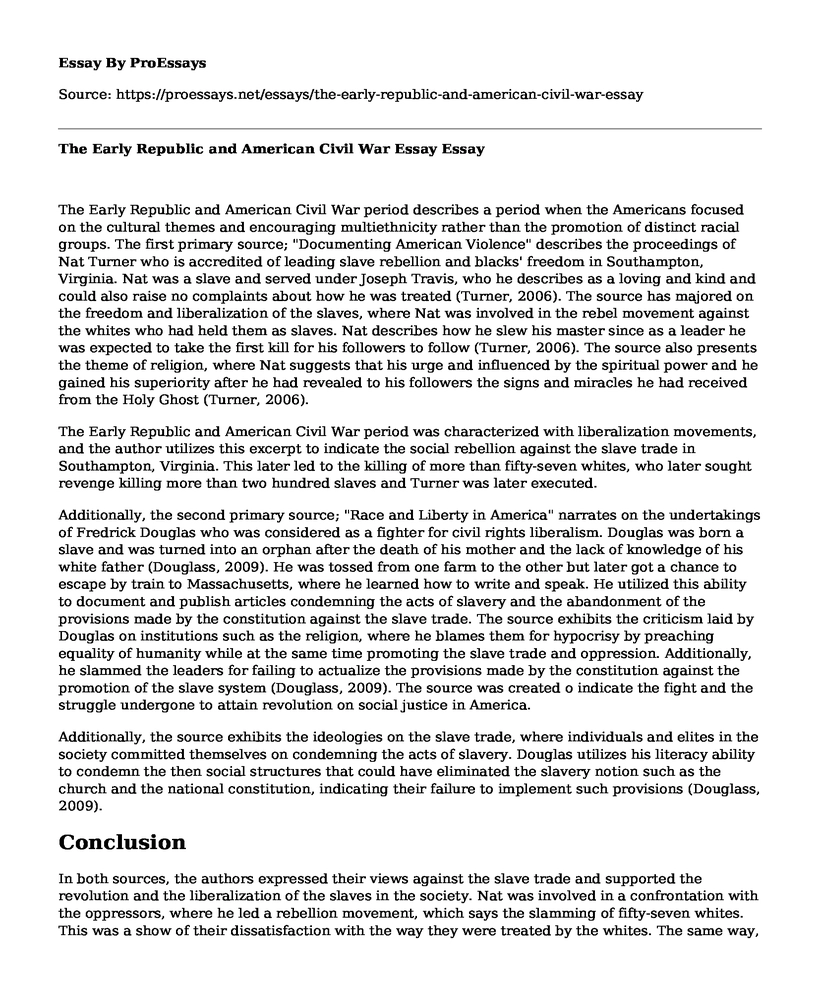The Early Republic and American Civil War period describes a period when the Americans focused on the cultural themes and encouraging multiethnicity rather than the promotion of distinct racial groups. The first primary source; "Documenting American Violence" describes the proceedings of Nat Turner who is accredited of leading slave rebellion and blacks' freedom in Southampton, Virginia. Nat was a slave and served under Joseph Travis, who he describes as a loving and kind and could also raise no complaints about how he was treated (Turner, 2006). The source has majored on the freedom and liberalization of the slaves, where Nat was involved in the rebel movement against the whites who had held them as slaves. Nat describes how he slew his master since as a leader he was expected to take the first kill for his followers to follow (Turner, 2006). The source also presents the theme of religion, where Nat suggests that his urge and influenced by the spiritual power and he gained his superiority after he had revealed to his followers the signs and miracles he had received from the Holy Ghost (Turner, 2006).
The Early Republic and American Civil War period was characterized with liberalization movements, and the author utilizes this excerpt to indicate the social rebellion against the slave trade in Southampton, Virginia. This later led to the killing of more than fifty-seven whites, who later sought revenge killing more than two hundred slaves and Turner was later executed.
Additionally, the second primary source; "Race and Liberty in America" narrates on the undertakings of Fredrick Douglas who was considered as a fighter for civil rights liberalism. Douglas was born a slave and was turned into an orphan after the death of his mother and the lack of knowledge of his white father (Douglass, 2009). He was tossed from one farm to the other but later got a chance to escape by train to Massachusetts, where he learned how to write and speak. He utilized this ability to document and publish articles condemning the acts of slavery and the abandonment of the provisions made by the constitution against the slave trade. The source exhibits the criticism laid by Douglas on institutions such as the religion, where he blames them for hypocrisy by preaching equality of humanity while at the same time promoting the slave trade and oppression. Additionally, he slammed the leaders for failing to actualize the provisions made by the constitution against the promotion of the slave system (Douglass, 2009). The source was created o indicate the fight and the struggle undergone to attain revolution on social justice in America.
Additionally, the source exhibits the ideologies on the slave trade, where individuals and elites in the society committed themselves on condemning the acts of slavery. Douglas utilizes his literacy ability to condemn the then social structures that could have eliminated the slavery notion such as the church and the national constitution, indicating their failure to implement such provisions (Douglass, 2009).
Conclusion
In both sources, the authors expressed their views against the slave trade and supported the revolution and the liberalization of the slaves in the society. Nat was involved in a confrontation with the oppressors, where he led a rebellion movement, which says the slamming of fifty-seven whites. This was a show of their dissatisfaction with the way they were treated by the whites. The same way, Douglas utilized his intellectual and literacy ability to publish articles to criticize the white's hypocrisy on the idea of eliminating slavery. For instance, he slammed the church as well as leaders on their failure to eliminate slavery.
References
Turner, N. (2006). Nat Turner describes his rebellion. In C. Waldrep & M. A. Bellesiles (Eds.), Documenting American violence: A sourcebook (pp. 124-127). Retrieved from http://site.ebrary.com/lib/westerngovernors/reader.action?docID=10142487&ppg=139 (Original work published 1831).
Douglass, F. (2009). Fourth of July oration. In J. Bean & G. Saari (Eds.), Race and liberty in America: The essential reader (pp. 38-42). Retrieved fromhttp://site.ebrary.com/lib/westerngovernors/reader.action?docID=10495368&ppg=61 (Original work published 1852).
Cite this page
The Early Republic and American Civil War Essay. (2022, May 26). Retrieved from https://proessays.net/essays/the-early-republic-and-american-civil-war-essay
If you are the original author of this essay and no longer wish to have it published on the ProEssays website, please click below to request its removal:
- The Conquest of Alexander the Great, His Legacy and Impact on Persia, India, and Egyp Essay
- Jack Ma and His Two Essential Leadership Traits Essay Example
- King Hammurabi's Babylon: The Birthplace of a Historic Set of Laws - Essay Sample
- Essay Example on Black Americans: A History of Oppression and Resistance
- American War of Independence: Freedom from British Rule - Essay Sample
- Essay Example on Marco Polo: A Brief History of the Explorer
- Essay Sample on The Fall of the Ottoman Empire: Creating the Modern Middle East







